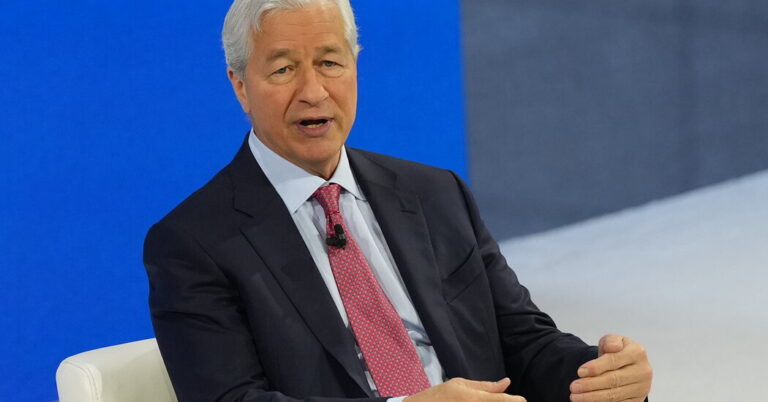Jamie Dimon, CEO of JPMorgan Chase, warned of a “troubling” global landscape on Friday, highlighting a cascade of pressures, including war, rising geopolitical tensions and inflation, that threaten the economy and could weigh on the performance of the world’s largest bank. country.
Mr. Dimon’s remarks, made at the same time as his bank’s quarterly results report – which revealed weakness in certain sectors of activity – add to his litany of concerns about the US economy as the Federal Reserve considers when and if to cut interest rates, especially in light of this week’s hotter-than-expected situation. inflation data.
In a call with reporters Friday, Mr. Dimon underscored his angst, calling inebriated financial markets “too happy.” He said he could not predict whether the economy would enter a recession, but that “the risk of bad consequences is higher than people think.”
Mr. Dimon is the most prominent banking executive. Not only is JPMorgan exposed to all aspects of the global economy, but he is the only major bank executive left after the 2008 financial crisis, and his statements are closely followed on Wall Street and in Washington. He was the only executive from a major U.S. lender to attend this week’s meeting. State dinner at the White House for the Japanese Prime Minister.
However, its gloom is also constantly at odds with the strength of financial markets. At the end of 2022, for example, he predicted economic difficulties and, potentially, a severe recession for the following year; instead, the American economy is booming in 2023.
Indeed, Citigroup Chief Financial Officer Mark Mason, speaking Friday as his own bank reported results, had a relatively optimistic view. Mr. Mason called the global economy “resilient” and said that while Citi expected economic growth to slow throughout the year, strong consumer spending and employment data were reasons to be optimistic.
JPMorgan reported first-quarter profit of more than $13 billion and revenue of nearly $42 billion, both above analysts’ expectations. But he said there had been a decline in deposits as customers looked to invest their money rather than leaving it in checking and savings accounts, and he warned of higher spending at the future. JPMorgan also revealed an unexpected and sharp decline in its net interest income, a closely watched financial metric that essentially measures the amount of money it is able to make from its loans.
Wells Fargo, the nation’s third-largest bank, released separate results Friday that also included a decline in that measure. Quarterly profit was $4.6 billion, down 7% from the same period a year earlier. The bank’s average deposits also fell, and the number of new loans made declined from last year, in part because of moves by its executives to reduce mortgage lending.
Shares of both banks were down in early trading Friday.
Many economists predicted that this year would bring a what is called a soft landingor a slight slowdown in growth and inflation that would allow the Federal Reserve to lower interest rates in an orderly manner.
Now, with little indication of any slowdown, it’s unclear whether the central bank will make the three interest rate cuts officials had predicted for the year. Mr. Dimon was one of the few banking executives to say they were preparing for the possibility of another interest rate hike, a move that would suggest more extreme inflation than currently measured.
Mr. Dimon made further remarks on the delicate environment in which his annual letter to shareholders this week. He lamented, as he had before, that the United States had engaged in deficit spending and rattled off a list of complaints about the failings of public and private leaders. (“Social media could do more,” he wrote.) Referring to Russia’s invasion of Ukraine and other crises, he wrote that recent events “could very well create risks that could dwarf anything that has happened since World War II.”
On Friday, he said the topic on his mind was “the future of the free world.”
Emily Flitter contributed to this report.


